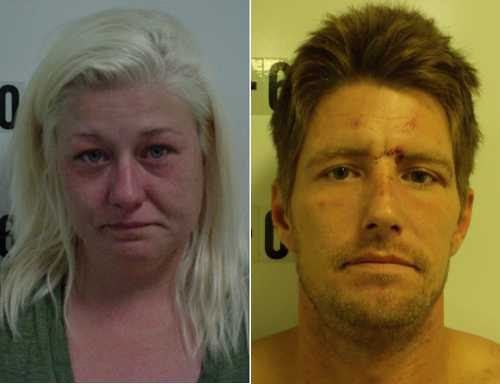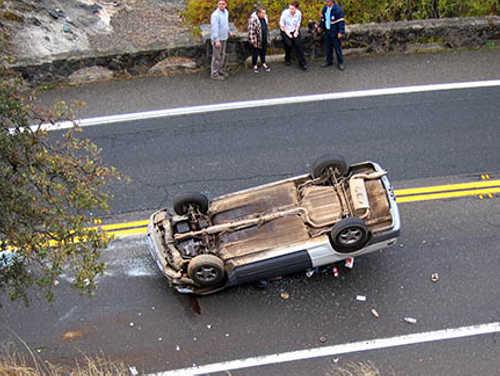LAKEPORT, Calif. – At the end of another full day of testimony in the double-homicide trial of a former Maine resident, the judge on Thursday afternoon denied a mistrial motion that had been pending since the proceedings began last week.
Defense attorney Stephen Carter filed the motion last week on behalf of his client, 32-year-old Robby Alan Beasley, accused of shooting to death Frank Maddox, 32, and his wife, Yvette, 40, of Augusta, Maine, along the side of Morgan Valley Road on Jan. 22, 2010.
Carter’s motion resulted from prejudicial statements made on the first day of trial Nov. 7 by 30-year-old Elijah Bae McKay, Beasley’s alleged accomplice.
Judge Andrew Blum had heard arguments last week both by Carter and prosecutor Art Grothe on the mistrial motion and then took time to review additional case law. He ruled Thursday that the trial could move forward.
Beasley allegedly believed the Maddoxes – who he had invited to California to work for him in his marijuana growing and trafficking business – had stolen marijuana from his apartment, which allegedly formed the motive to kill them.
Likewise, Beasley had been invited to California by McKay, who he had grown up with in Maine. McKay, who has not yet stood trial, is facing murder charges as well, and is accused of being Beasley’s accomplice, having provided him with the 9 millimeter handgun and ammunition allegedly used in the murders.
McKay, however, has testified to believing that Beasley was only going to get the couple to give him a ride to the airport, and intended to stop along the way, interrogate them and get them to admit the theft. Beasley would tell him that the situation changed and he shot both of the Maddoxes in the head after a confrontation.
During a rambling narrative on Nov. 7, McKay had stated, “and you know, I’ve known Robby for a long time and he’s talked about killing people before and he’s never done it,” according to the transcript of the statement Blum read Thursday afternoon.
Blum said there is the potential for prejudice from that statement, but the presumption under the law is that such prejudice can be cured in most cases.
“The statement by itself, if left alone, could be seen as very prejudicial,” Blum said, adding, “But we didn’t leave it at that.”
Jurors were admonished twice that McKay had improperly volunteered the information. “I think with that clarification made to the jury, they know that it’s not serious,” Blum said.
Blum said he hadn’t found a single published case that held such statements were incurable when their triviality was explained to a jury.
“I have no doubt whatsoever that they can set this aside,” said Blum, noting he also had asked the jury if they had understood his admonitions, and they said they they understood.
“For all those reasons the mistrial motion is denied,” he said.
McKay testimony continues Thursday
McKay has continued to testify intermittently since the trial began last week, with the prosecution having to interrupt his testimony in order to allow for the other witnesses who have been scheduled to come to the stand.
When McKay’s testimony resumed Thursday morning, Carter continued his questioning about the marijuana growing business that McKay and Beasley had been involved in at the time of the murders.
Beasley had worked for McKay at his marijuana garden on Morgan Valley Road and also had grown clones in an apartment in Lower Lake, the proceeds of which he split with McKay.
Carter also reviewed with him details of conversations he had with Beasley about trying to scare the Maddoxes in the days before the murder. Beasley was to tell the couple that his grandmother died and he needed to return to Maine, so he needed a ride to the airport, with McKay to pick him up after he confronted them.
“I didn’t think it would ever work,” said McKay, who recalled that Beasley had only talked of killing the couple during a conversation on Jan. 20, 2010. Beasley had marijuana stolen from the Lower Lake apartment sometime during the previous 10 days, McKay said.
A difficult witness
During the morning session, Ryan Gilman, who had been a neighbor of Beasley’s at the Lower Lake apartments, took the stand. He had lived at the apartments full-time and then part-time while he traveled to the Mt. Shasta area for work.
“We didn't get along too well,” Gilman said of he and Beasley.
He said he had been out of town at the time of the marijuana theft, and there was “no possible way” he could have been involved.
Gilman was asked by Carter to draw a diagram of the apartment complex after Gilman had pointed out that a diagram McKay had made on Wednesday was wrong.
Gilman proved at times a frustrated and frustrating witness, getting upset about questions about his past and if he had been conducting a marijuana business. He said he had grown six plants.
After the lunch break, with McKay back on the stand, Carter asked him to draw a diagram of Morgan Valley Road, and where his home was in relation to where Beasley shot the Maddoxes and left their bodies.
On the day of the murders, McKay was at his brother’s birthday party in Clearlake when he got a call from Beasley asking him to pick him up near a gate on Morgan Valley Road. When they spoke, Beasley made a point of saying that “it hadn’t gone as it should have.”
McKay said when he pulled over on Morgan Valley Road, Beasley came running toward his Range Rover. “He was very distressed looking and his eyes were big,” said McKay, adding that Beasley was “freaking out.”
Beasley told McKay that he had shot the couple and afterward, “He made the comment he was going to go to hell,” McKay said.
Considered a danger
Beasley refused to bury the bodies after seeing passing vehicles. McKay said it wasn’t until the next morning, when they moved the Maddoxes’ pickup down toward Middletown, that Beasley gave him the full story.
Carter asked him if he had been glad the couple was dead. “I wasn’t glad they were dead but I felt safer,” he replied. He felt they had become dangerous to his family, which included his circle of close friends – among them Beasley, who he said was like a brother to him.
McKay recalled driving Beasley home from dropping off the Maddoxes’ pickup. He told Beasley he was angry about how things had unfolded and wanted to know what happened.
“He basically tried to make his case on why it was all right that he shot them and why he had to,” McKay said.
Beasley told McKay that he shot the couple after he pulled them from the truck and they refused to answer his questions. He then shot Frank Maddox in the leg, Yvette Maddox fainted, and Frank Maddox told Beasley he would kill him if he didn’t finish him off.
According to McKay, Beasley then shot Frank Maddox in the head before shooting his wife. He drug them down a nearby embankment, and when he saw they were still alive, shot them both in the head one more time.
Beasley would offer McKay $20,000 to go back and bury them. “I don’t need money that bad,” said McKay.
In the days afterward, McKay would continue to ask Beasley if he buried the couple, but Beasley refused to go back.
Carter asked McKay if his life then proceeded as normal. “If you can call the life I live normal,” McKay said.
He recalled going into town in early March and seeing the newspaper, with the front page story about the Maddoxes’ bodies being discovered. He went to Beasley’s home to angrily show him the paper.
McKay also answered questions about the immunity agreement he has with the District Attorney’s Office to testify. Any new information he gives won’t be used against him, but he has not been promised a deal in exchange for his testimony.
“For all I know, I’m screwed,” he said.
After he was arrested in late 2010, McKay said he was told by his attorney at the time that his girlfriend was going to be arrested and their young son put into the care of Child Protective Services if he didn’t come clean.
Carter asked him if he killed the Maddoxes. “If I killed the Maddoxes we wouldn’t be here right now,” he said, adding that, no, he didn’t, nor did he take part in a conspiracy to murder them.
Late on Thursday, outside of the jury’s presence, testimony was given by jail staff about a drawing Beasley is alleged to have sent a couple he knew that Grothe said had threatening overtones. It suggested they were going to jail and said, “Don't lie … liar.”
Blum decided to exclude that evidence but agreed to wait until Friday morning to get more information from the prosecution in order to determine if he would allow testimony from a correctional officer who found the words, “Elijah McKay is a rat punk bitch snitch New England” scratched on the painted metal door of Beasley’s jail cell.
Blum released the jury shortly before 4 p.m. and asked jurors return at 9 a.m., when testimony is set to resume.
Email Elizabeth Larson at This email address is being protected from spambots. You need JavaScript enabled to view it. . Follow her on Twitter, @ERLarson, or Lake County News, @LakeCoNews.









